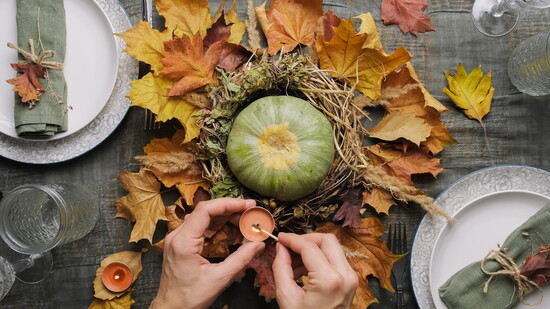As the leaves turn golden, the air grows crisp, and storefronts fill with pumpkins and turkeys, families begin preparing for the long-cherished Thanksgiving traditions. For many, it's a season of returning home, sharing family recipes, and carrying on traditions passed down through generations.
Yet for others—those who may not have family nearby or who simply wish to extend the season of gratitude—Friendsgiving has become a beloved addition to the holiday. Blending the warmth of friendship with the spirit of Thanksgiving, it offers a space to gather, share a meal, and celebrate chosen family, making the holiday feel even more meaningful.
Where Did the Term "Friendsgiving" Come From?
Many assume the idea came from the popular television show Friends, with its iconic holiday episodes that center around friends sharing a meal. Merriam-Webster notes that the word itself didn't originate there: Internet sleuths traced the first online usage of “Friendsgiving” to a Twitter (now X) post in 2007 and speculated that the word was probably used in spoken language first. The tradition quickly caught momentum, and in 2011, Bailey's Irish Cream featured the word in an advertising campaign, helping propel it into the cultural spotlight. "Though the term 'Friendsgiving' seems to be everywhere, it's surprisingly new," records Merriam-Webster. By January 2020, "Friendsgiving" had officially entered the dictionary, solidifying itself as a recognized tradition. Since then, lifestyle magazines, food blogs, and social media creators have embraced it—sharing menus, planning tips, and creative new ways to celebrate.
Friendsgiving "Rules"
Though it's less formal than Thanksgiving, Friendsgiving often follows some unofficial guidelines meant to simplify planning and make the event enjoyable for all. According to The Kitchn, Food Network, and Southern Living, there are a few general "rules" that hosts and guests alike can follow:
1. Make It a Potluck
The heart of Friendsgiving lies in shared responsibility. Guests bring dishes, which lightens the host's load and ensures a variety of flavors. While some prefer to stick with classics—like green bean casserole or canned cranberry sauce—Friendsgiving is the perfect opportunity to debut a treasured family recipe or something entirely new.
2. Ensure Variety
To avoid a table full of desserts and no sides, some organizers use sign-up sheets or shared documents to help guests coordinate meals. Assigning general categories—like appetizers, sides, mains, or desserts—keeps the spread well-balanced and delicious.
3. Leave the Turkey to the Host
Turkey is a centerpiece dish that does not travel well, and it requires preparation space that most guests will not have access to. For this reason, hosts are recommended to take responsibility for the turkey and the gravy. Guests can then fill in the table with complementary sides and desserts.
4. Celebrate Before Thanksgiving Day
While there's no official Friendsgiving date, most celebrate in the weeks leading up to Thanksgiving. Hosting earlier ensures friends can attend without conflicting family commitments. Since the holiday season gets busy quickly, it's wise to set a date and send invitations early.
5. Focus on Connection
More than food or decorations, Friendsgiving is about gratitude and togetherness. Extending an invitation to a coworker, neighbor, or classmate who might otherwise spend the holiday alone captures the very essence of the season.
6. Make Friendsgiving Your Own
The beauty of Friendsgiving is its flexibility and creativity. Some groups host themed meals, swapping turkey for tacos or pot roast. Others add games or a "gratitude circle" to share thanks. In a rushed and disconnected world, Friendsgiving reminds us to slow down and savor community. It's proof that traditions aren't just inherited—they're created.
Whether your table has childhood friends, new neighbors, or coworkers who feel like family, the act of coming together over food and gratitude is timeless.
Though the term "Friendsgiving" is widely employed today, it's surprisingly new—as recent as 2007, according to some internet sleuths.
